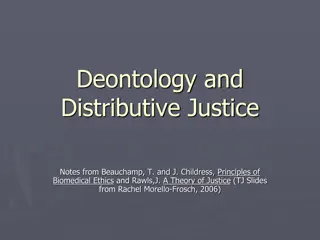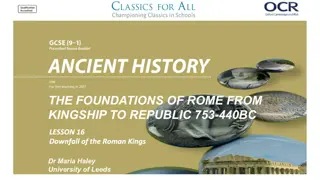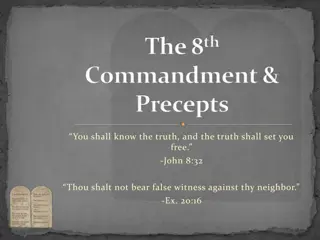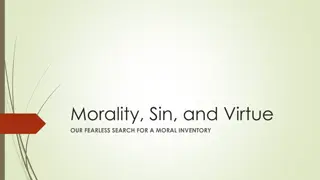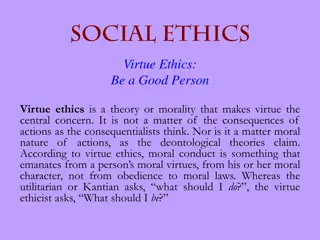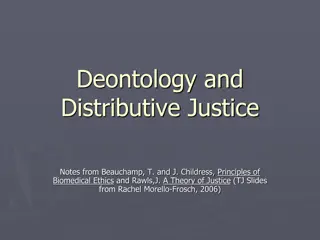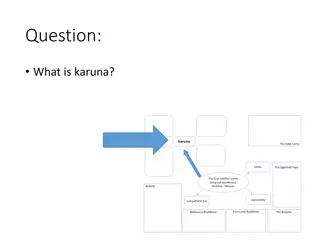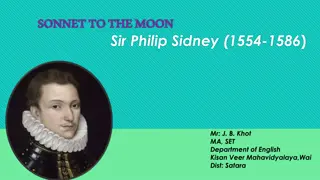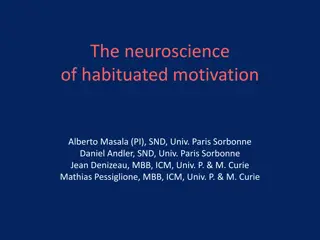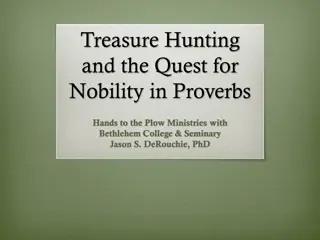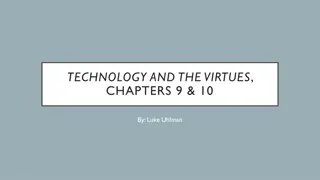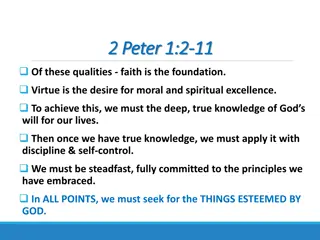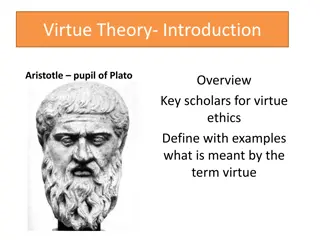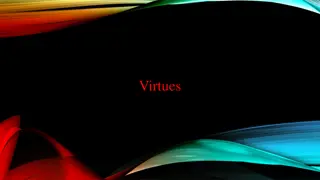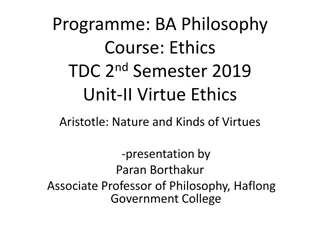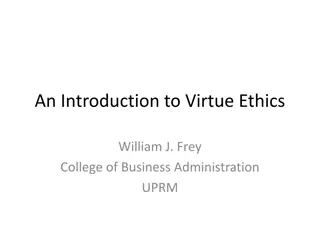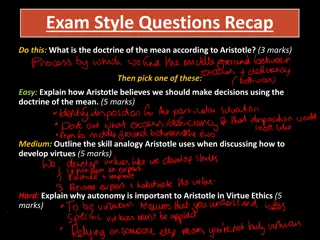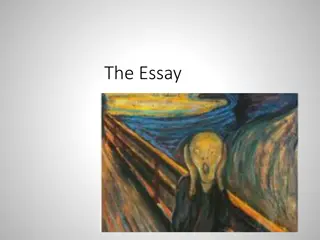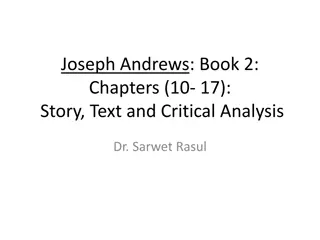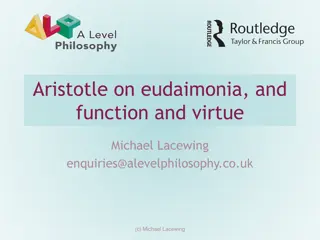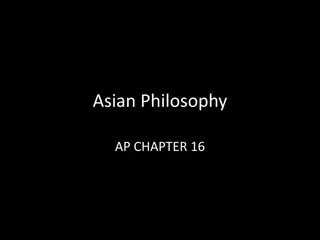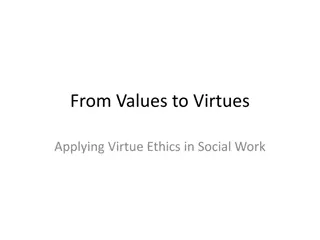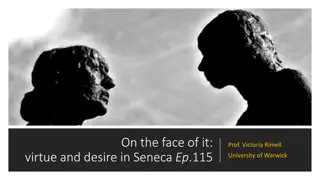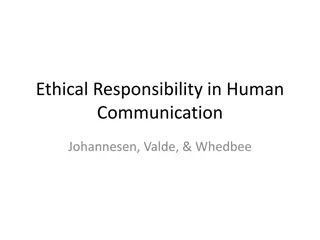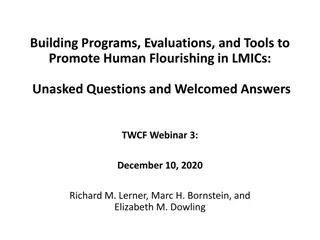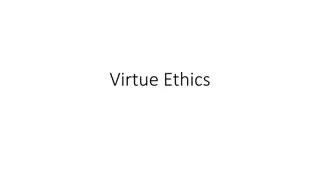Understanding Deontology and Distributive Justice in Ethics
Deontology, originating from the Greek words for duty and study of, focuses on morally required, forbidden, or permitted choices. It emphasizes obedience to duty and opposes utilitarianism, prioritizing what is morally right over the overall good. Unlike virtue theories, deontology assesses moral ob
2 views • 32 slides
Understanding Human Values, Ethics, and Ethical Frameworks
Human values and ethics play a crucial role in guiding individual behavior and decision-making. Human values encompass aspects such as respect, integrity, responsibility, fairness, compassion, honesty, trustworthiness, and cooperation. Ethics provide broader guidelines for determining right and wron
3 views • 7 slides
The Downfall of the Roman Kings: Lucretia's Role in Establishing the Republic
The Rape of Lucretia by Sextus Tarquinius was a key event leading to the downfall of the Roman kings and the establishment of the Republic. Lucretia's character, representing chastity and virtue, inspired Brutus to take a stand against the tyrannical rulers. Brutus's impassioned speech and vow marke
0 views • 6 slides
Ancient Greek Conceptions of Citizenship by Aristotle
Ancient Greek conceptions of citizenship, as discussed by Aristotle, emphasized the close-knit nature of city-states, where citizenship was a bond forged by active participation in public affairs. Citizenship was viewed as a privilege, exclusive in nature, with a strong emphasis on civic virtue, tru
0 views • 9 slides
The Importance of Truth in Life and Faith
The significance of truth, as reflected in the 8th Commandment and precepts, emphasizes the relationship between truthfulness and divine principles. From understanding what truth entails to witnessing to truth in life, this content delves into the essence of truth as a guiding virtue in both persona
0 views • 20 slides
A Mother's Tale: Night of the Scorpion by Nissim Ezekiel
One fateful night, a scorpion stings a mother, bringing together rationality and faith, rural life, superstitions, virtue, vice, and the undying love of a family. As the villagers seek remedies, the struggle between science and belief unfolds, ultimately leading to a poetic resolution of gratitude a
0 views • 7 slides
Understanding Chastity: Exploring Its Meaning and Significance
Delve into the concept of chastity and its importance in Islamic ethics. Explore various aspects such as identifying different kinds of chastity, methods to maintain chastity, and analyzing its impact on society. Engage in activities and discussions to deepen your understanding of this valuable virt
1 views • 19 slides
Ethical Studies Course Overview and Activities
Delve into the world of Ethical Studies with this comprehensive course overview. Explore themes like Ethical Language and Thought, Natural Law, Situation Ethics, and more. Engage in activities like Virtue Ethics starters, fortune line graphs, and discussions on moral dilemmas. Dive into the principl
0 views • 17 slides
Exploring Morality, Sin, and Virtue: A Journey of Self-Discovery
Dive into the profound exploration of morality, sin, and virtue, uncovering the essence of self-reflection and ethical understanding. From delving into the definitions of these concepts to understanding the nature of sin and virtue, embark on a transformative path towards enlightenment and inner gro
1 views • 22 slides
Introduction to ABA, Ethics, & Core Principles: A Paradigm Overview
This chapter provides a historical context of approaches to ethical behavior in behavior analysis. It discusses theoretical conflicts, the importance of consequences, and reviews dominant paradigms in clinical ethics such as virtue ethics, consequentialism, and deontology. It explores the concept of
0 views • 38 slides
Exploring Roots of Goodness and Virtue in Words
Delve into the roots "ben", "bene", and "bon" that signify goodness, learn about inheritances and benevolent individuals, discover terms for authenticity and exceeding expectations, and find words describing favorable outcomes and altruistic actions. Uncover the essence of kindness, generosity, and
0 views • 24 slides
Understanding Virtue Ethics in Aristotle's Philosophy
Virtue ethics places virtue at the center of morality, emphasizing moral character over obeying laws or focusing on consequences. Aristotle's influence on virtue ethics is significant, highlighting the importance of striving to be a virtuous person whose actions stem from a virtuous character. Accor
6 views • 24 slides
Deontology and Distributive Justice in Ethics
Deontology, rooted in the concept of duty, focuses on morally required, forbidden, or permitted choices. It emphasizes obedience to duty, opposing utilitarian claims. Unlike virtue theories, deontology prioritizes what is right over an overall conception of good. Immanuel Kant's categorical imperati
0 views • 32 slides
Understanding Human Values, Ethics, and Ethical Frameworks
Human values and ethics play crucial roles in guiding human behavior and decision-making. Values such as respect, integrity, responsibility, fairness, compassion, honesty, trustworthiness, and cooperation are fundamental in shaping individual interactions with others and society. Ethics provide broa
1 views • 7 slides
Understanding Karuna in Buddhist Philosophy
Karuna, a key virtue in Mahayana Buddhism, emphasizes recognizing and alleviating the suffering of others. Bodhisattvas exemplify this virtue through selflessness, while figures like Amitabha Buddha embody compassion through acts like welcoming believers to Sukhavati. The concept of karuna is closel
0 views • 14 slides
Sonnet to the Moon by Sir Philip Sidney: A Poetic Ode to Unrequited Love
Born in 1554, Sir Philip Sidney was an Elizabethan courtier, poet, and scholar. "Sonnet to the Moon" from his work "Astrophel and Stella" explores unrequited love through an address to the moon as a sympathetic observer. The poem reflects on the nature of love, beauty, and virtue. With eloquent imag
0 views • 9 slides
Understanding the Neuroscience of Habituated Motivation in Virtue Cultivation
Exploring the intersection of Aristotelian theory, cognitive neuroscience, and moral philosophy, this research delves into the conditions and mechanisms underlying the cultivation of virtuous habits through apprenticeship. By leveraging diverse expertise in philosophy, neuroscience, and cognitive sc
2 views • 21 slides
Unveiling the Wisdom of Proverbs: A Treasure Hunt for Nobility
Delve into the rich tapestry of Proverbs with Jason S. DeRouchie, PhD, as he leads you on a quest for wisdom and nobility. Explore the poetic and memorable nature of Proverbs, discovering the timeless truths hidden within each proverbial bite. Gain insights into the art of deciphering these pithy sa
0 views • 42 slides
Exploring the Ethical Implications of Autonomous Military Robots
The chapters 9 and 10 of "Technology and the Virtues" by Luke Uhlman delve into the ethical dimensions of roboethics, particularly focusing on the virtues in the context of robot ethics. Discussions revolve around the impact of autonomous military robots on virtue cultivation, with emphasis on coura
1 views • 9 slides
The Trial and Death of Socrates in Ancient Athens
The trial and execution of Socrates in ancient Athens sheds light on the complexities of Athenian democracy and the philosophical controversies surrounding Socrates' questioning methods. Socrates' relentless pursuit of truth and virtue led to his condemnation by the democratic system he lived in. Pu
1 views • 13 slides
Exploring the Concept of Godliness in the Bible
Dive into the depths of Godliness as outlined in 2 Peter and various passages of the Bible. Discover the importance of faith, virtue, perseverance, and true knowledge in living a life of piety and reverence towards God. Explore how godliness is reflected in character, conduct, and daily living, as i
0 views • 12 slides
Ethical Theories: Divine Command vs. Virtue Theory Explained
Divine Command Theory asserts that morality is derived from God's commands, contrasting with Virtue Theory which focuses on developing moral virtues to achieve human flourishing and excellence. Divine Command Theory relies on religious texts, while Virtue Theory emphasizes the cultivation of virtues
0 views • 24 slides
Understanding Virtue Ethics and Aristotle's Virtue Theory
Delve into the world of Virtue Ethics with a focus on Aristotle's Virtue Theory, exploring the concept of virtue, key scholars in virtue ethics, and the development of virtues. Discover the Golden Mean, Eudaimonia, and the Beatitudes in relation to virtue theory, alongside discussions on moral decis
0 views • 21 slides
The Essence of Christian Virtues and Faith
In addition to the Beatitudes of Jesus, the fruits of the Holy Spirit encompass Christian virtues. These virtues, including faith, hope, knowledge, wisdom, honesty, and more, reflect attributes of God and should be inherent in all individuals. Faith serves as the cornerstone of Christian virtue, emp
0 views • 14 slides
Aristotle's Virtue Ethics: The Nature and Kinds of Virtues
Aristotle's virtue ethics discusses the nature of virtues as a disposition unique to humans that enables them to function well according to reason. Virtue involves finding the mean between excess and deficiency, not endorsing mediocrity. It emphasizes that virtues are acquired through habitual pract
1 views • 18 slides
Exploring Virtue Ethics and Human Flourishing
Delve into the realm of virtue ethics, uncovering the significance of moral education, self-excellence, and rethinking traditional moral theories. Learn how virtues shape our actions, character, and perception of ethical dilemmas, ultimately leading to human fulfillment and happiness.
1 views • 21 slides
Understanding Aristotle's Doctrine of the Mean and Voluntary Actions
Explore Aristotle's doctrine of the mean, the skill analogy used in developing virtues, the importance of autonomy in virtue ethics, and the distinction between voluntary and involuntary actions in moral responsibility as discussed in his Nicomachean Ethics.
0 views • 22 slides
Analysis of the Prologue in Sudraka's Play "Mrichchhakatika
Explore the intricate details of the prologue in Sudraka's play "Mrichchhakatika," including its themes, the introduction of key characters like Charudatta and Vasantasena, and the depiction of poverty, hunger, and various forms of hunger portrayed in the play. The prologue sets the stage for the un
0 views • 9 slides
Understanding Kindness towards Animals in Islamic Teachings
Explore the importance of showing kindness towards animals based on Islamic teachings, including Hadith references, Quranic mentions, and engaging activities to foster empathy and compassion. Delve into stories emphasizing compassion towards animals and reflect on how to embody this virtue in daily
0 views • 18 slides
Exploring Civic Virtue and Institutional Design in Early Modern Governance
Delve into the complexities of civic virtue and institutional design in early modern governance through a 3,000-word essay. Analyze the necessity of civic virtue within the state and consider contrasting perspectives on whether institutional design can replace it. Use primary texts to support your a
0 views • 32 slides
Analysis of Selfishness and Virtue in Chapters 10-11 of Joseph Andrews
The text from Chapter 10 of Joseph Andrews explores themes of selfishness, materialism, and virtue as a group confronts the aftermath of an adventure. The characters argue over their shares of an 80-pound reward, revealing their self-serving nature. The chapter delves into the motivations and action
0 views • 41 slides
Understanding Aristotle's Concept of Eudaimonia and Virtue
Aristotle's philosophy delves into the concept of eudaimonia, which is not mere pleasure or wealth but the state of living well and flourishing. Eudaimonia is achieved through the exercise of virtues, qualities that aid in fulfilling one's function or characteristic activity. This pursuit of eudaimo
0 views • 10 slides
Understanding Confucius: Key Concepts and Philosophical Ideals
Confucius, born during the Zhou Dynasty, emphasized virtue, social reform, and humanism in his teachings. He focused on values like Ren (human-heartedness) and key concepts such as De (virtue) and Li (propriety). By studying human practices, he sought to achieve goodness and harmony. Explore the phi
0 views • 23 slides
Applying Virtue Ethics in Social Work: From Values to Virtues
Exploring the application of virtue ethics in social work, this content delves into the transition from foundational values to virtuous character traits. It discusses the importance of moral qualities, virtues, and practical wisdom in making ethically informed decisions. Highlighted are the perspect
0 views • 14 slides
Virtue Ethics in Bigelow's Films: A Moral Exploration
The discussion delves into the virtue ethics portrayed in Kathryn Bigelow's films "The Hurt Locker" and "Zero Dark Thirty." It raises questions on the ethics of actions taken in the war on terror, particularly the controversy surrounding the depiction of torture as crucial in the killing of Bin Lade
0 views • 12 slides
Exploring Virtue and Desire in Seneca's Philosophy
Seneca presents a nuanced version of Stoicism, allowing for human interaction and love while emphasizing the purity of love separate from bodily desires. Through Seneca's writings, the distinction between love and desire is made clear, touching on themes of body, mind, desire, and veneration. The in
0 views • 15 slides
Understanding Ethical Responsibility in Human Communication
Ethical responsibility in human communication entails making judgments on rightness, wrongness, virtue, and obligation. It explores the importance of choice, coercion, and the distinction between morals and ethics. The text delves into relativism, ethical ramifications in communication, and the prac
0 views • 9 slides
Understanding and Promoting Human Flourishing in LMICs: Insights from TWCF Webinar Series
Explore the discussions on character virtue development, program design, and evaluation in low- and middle-income countries (LMICs) from the TWCF webinar series led by Richard M. Lerner, Marc H. Bornstein, and Elizabeth M. Dowling. Discover valuable insights on reliability, validity, and the use of
0 views • 67 slides
Insights into Virtue Ethics and Critiques of Kantian Morality by Philippa Foot
Philippa Foot, a key figure in the modern revival of Aristotle's virtue ethics, critiques the Kantian approach to morality. She emphasizes the importance of motivation in cultivating virtues, arguing that feeling bound by morality stems from wanting to lead a flourishing life. Through her works, Foo
0 views • 14 slides
Forms of Moral Reasoning and Ethics in Decision-Making
Explore the main forms of moral reasoning in ethical decision-making, including virtue ethics, deontological reasoning, and teleological reasoning. Understand the importance of developing ethical virtues and principles in guiding behavior. Delve into examples of reasoning from virtue and deontologic
0 views • 28 slides
